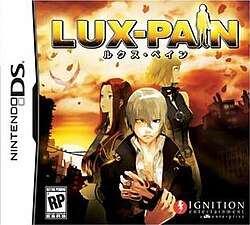

Lux-Pain. Just the name invites a certain kind of intrigue, doesn't it? It's like the title of a dark poetry collection from a brooding teenager who just discovered existentialism. Here we have a visual novel set in the gloomy Kisaragi City, where despair and worms abound. Yes, you heard that right. Worms. And I don't mean the kind you find in an apple or in a magic show. In Lux-Pain, these are metaphorical parasites feeding off human emotions, and as our not-so-heroic protagonist directs their stylus deeper into the sorrows of society, you might just find that the game serves up a mix of compelling themes and confusing gameplay mechanics.
Diving into the gameplay, Lux-Pain lets players dig into the emotional depths of characters using the Nintendo DS's stylus (the precursor to modern gaming tablets, if you will). The game attempts to stretch beyond standard visual novel fare by introducing a mechanic reminiscent of a twisted, hidden object game where finding 'worms' in people's feelings is the main focus. You poke at their psyche, which sometimes feels like you're picking at the emotional scabs of virtual strangers. Fail to erase these worms in time, and bam! You get the dreaded Game Over screen-quite the emotional rollercoaster for a once-happy gamer! The game is structured in episodic segments that advance the grim storyline. These segments feature 'Silent' foes that can be likened to boss battles, but instead of epic quests and mythical dragons, you face off against manifestations of despair. Throughout the game, you meet a variety of characters, each shading the plot with layers of sorrow, angst, and the occasional cringy localization that begs the question, "Did they really mean to say that?" Despite the occasional clumsy writing, the serious themes surrounding truancy, suicide, and emotional abuse are compelling enough to keep you engaged-assuming you can tolerate the self-inflicted wounds to your heart caused by those dreadful localization blunders.
Graphically, Lux-Pain aims for a stylized aesthetic, leaning heavily into the emotive and dreary tones of its story. Unfortunately, the production quality reveals its lower budget, featuring simplistic character designs and static backgrounds that sometimes feel like they were pulled from an early '00s anime. The character art presents a mix of both impressive and lackluster designs, somewhat reminiscent of hastily drawn manga panels that didn't quite make the cut. You'd think that deep themes would be complemented by equally profound visuals, but instead, the graphics often feel like they hover at a frustrating crossroads of potential and mediocrity. It's the kind of style that screams: "We could have really done something special here!" but instead settles for "Hey, we got these animations from a clip-art gallery!" If you squint just right, you might catch glimpses of creativity in the art direction, but only if you're willing to wrestle through the overall bland presentation. Sadly, using the DS to its fullest stylistic potential was a road not taken, and that's a shame considering the depth of emotion they attempted to capture.
Ultimately, Lux-Pain is a bold yet bungled exploration of emotional turbulence. It's commendable for tackling such heavy material in a medium that often skims the surface of fluff and fantasy. However, all that ambition meets a stumbling block when it comes to execution. The gameplay mechanics feel like a shovel rather than the deep digging tool it aimed to be, and the graphics leave much to be desired. While it might hold a specific charm for dedicated visual novel enthusiasts, newer players might find the localization more disheartening than enlightening. This isn't a game to jump into expecting smooth sailing; it's more of a dive into murky waters where a clever idea primarily lost in translation flops about, occasionally resurfacing for breath before sinking again. So unless you fancy a trip through the twisted threads of despair, it might be safer to steer clear of this particular title, or at least take it with a grain of salt (or an entire salt shaker). Lux-Pain: both a cry for help and a call for better localizers. What a combo!






